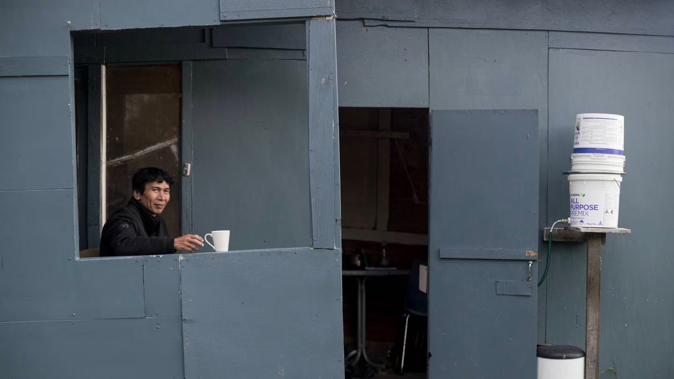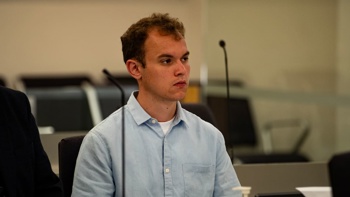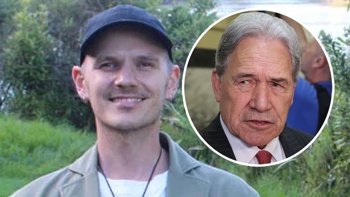
Overstayers from Indonesia have been found paying their landlord rent to live in makeshift sheds and a dilapidated caravan in West Auckland.
Despite having no visa to be in New Zealand, an employer has hired them to do construction work and paid them in cash.
A former immigration minister is outraged that authorities don’t appear to be investigating either the employer or the landlord for possible exploitation.
In an email seen by the Herald, an Immigration New Zealand (INZ) official said it had spoken to four potential complainants about the overstayers’ situation.
“In our view what we have been told does not amount to serious default required for a criminal exploitation,” the email said.
“We note that the complainants were paid in cash, and had no employment agreements but for the most part they were paid above minimum wage and were happy with their employer,” the email said.
Shed was built by one of the overstayers using discarded plywood. Photo / Dean Purcell
Tuariki Delamere, an immigration adviser and former immigration minister has slammed INZ’s “attitude” and is demanding the agency work with police on the matter.
“Landlords who are housing migrant overstayer workers in leaky plywood shacks should be prosecuted and the properties should be seized by police as proceeds of criminal activity,” he said.
“When employers are not prosecuted then the employers know that they can get away with exploiting the overstayer migrant workers.
“If this is the attitude of INZ then what’s the point of insisting that it is unlawful for employers to employ someone with a valid visa with work rights.”
What immigration laws say
By law, New Zealand businesses have a legal responsibility to ensure people their hire are legally entitled to work for them.
Employers who exploit workers face a penalty of up to seven years imprisonment and/or a $100,000 fine.
Hendra Adijaya has been unlawfully in NZ for over three years. Photo / Dean Purcell
If the employer knew the worker was not entitled to work, they could be fined up to $50,000 or $10,000 if knowledge cannot be proved.
Delamere said being paid the minimum wage does not mean the migrant workers were not being exploited.
“If you come from a country where wages are as low as 25 percent of the New Zealand minimum wage, then of course the overstayer migrant is happy to work for the NZ minimum,” Delamere said.
“New Zealanders refuse to work for exploitative wages and so the corrupt employers just go and employ overstayers knowing full well that INZ will not prosecute them for deliberately and knowingly breaking the law.”
A Herald investigation in September revealed that up to six overstayers from Indonesia have been living for up to four years in a plywood shed, chicken coop, and dilapidated caravan on a property in New Windsor.
The Migrant Exploitation Protection Visa
It was the latest of a shocking list of cases of foreign workers living in inhumane conditions.
They are not able to apply for the Migrant Exploitation Protection Visa (MEPV) or access any form of government support because they are not lawfully in New Zealand.
A MEPV is valid for six months and would allow the holder to work anywhere in New Zealand for any employer.
In September, the government announced temporary support for these migrant worker victims.
The package included accommodation in a motel, or about $220 per person per week of living cost support payments in the form of a payment card.
However, this does not apply for overstayers and those unlawfully in New Zealand like the Indonesians.
A report by Migrant Exploitation Relief Foundation (Merf) said the overstayers had escaped from exploitative working conditions on foreign fishing vessels.
Most have been without a visa to be in New Zealand for more than three years.
To live in their makeshift shelters, the overstayers say they paid a weekly rent of $125 to a landlady.
The Chinese woman, who lived in the main house, told the Herald she was collecting the rent on behalf of her son.
Migrant worker Hendra Adijaya who lives out the back of 19 Bollard Ave New Windsor, where Indonesian migrant workers are living in sheds made by themselves using plywood from a construction site. Photo / Dean Purcell
One of the occupants, Hendra Adijaya, 49, said he made the shed using discarded plywood he collected from a construction site.
The shed was not insulated and on cold nights, it “feels like living in the Antarctic”, he said.
Adijaya also said that when it rains, the roof leaks.
Auckland Council was not aware of the structures or living arrangements before the Herald’s query.
Following our report, the council’s compliance staff visited the property and issued the owner with a notice to fix.
The owner has been given three months to remove the shed and other unconsented structures.
Investigating exploitation
INZ’s national manager immigration investigations Stephanie Greathead said that there was a threshold to meet to claim migrant exploitation had occurred.
However the agency would look at the overall situation related to the employer, and not just whether they were exploiting migrants.
Greathead said it was incorrect to say that employers who hire overstayers will not be subject to investigation if the workers are happy with their working conditions.
“MBIE, not just INZ, investigates employers for a number of different reasons even if the employees haven’t complained or are satisfied with their working arrangements,” she said.
“There is a responsibility for employers to comply with New Zealand law and those who don’t do so, and if it falls within the MBIE remit, then we will investigate.”
Greathead reiterated that only those who are in New Zealand lawfully can apply for an MEPV.
However, she said there are other avenues unlawful migrants can pursue, and she encouraged them to contact INZ or seek advice from an immigration adviser.
In the email seen by the Herald, INZ has said that it had made contact with the overstayers and suggested that they contact an immigration adviser to apply for a visa under Section 61.
Section 61 of the Immigration Act provides for the Minister of Immigration with the power to grant a visa of any type to a person unlawfully in New Zealand and otherwise liable for deportation.
Arunima Dhingra, chairwoman of the NZ Association of Migration and Investment, said it was not the answer to the problem.
“A Section 61 request is a complex piece of work and more often than not, such overstayers will not be able to afford an immigration adviser or lawyer to assist with the process,” she said.
Dhingra said amnesty for overstayers required a delicate balance.
“We cannot be seen as a country that allows those that intentionally started on the wrong foot, to get a visa status rewarded,” she said.
“However, we also need to ensure that those who became unlawful immigrants due to circumstances outside their control are given amnesty and that agencies have provisions to look after them.”
NZ Association for Migration and Investment chairwoman Arunima Dhingra. Photo / Alex Burton
Dhingra said the employer needed to be held accountable for employing workers who did not have the legal right to work in the country.
“It is totally not OK for the authorities to dust their hands off such a situation despite knowing that [people are working] illegally,” Dhingra said.
“What action is being taken by MBIE against the businesses that are clearly breaching employment laws, hiring people without employment agreements, and most importantly, employing workers who are not legally allowed to work in New Zealand?”
The Accredited Employer Work Visa scheme
Meanwhile, there are multiple ongoing investigations into people linked to scams selling fake job offers to migrants who come under the Accredited Employer Work Visa (AEWV) scheme.
AEWV is a temporary work visa category introduced by the New Zealand Government to help fill labour shortages post-Covid. It is currently under review.
A licensed immigration adviser (LIA) became the first person arrested following investigations in the exploitation of more than 140 Indian and Bangladeshi migrant workers.
The LIA, who has interim name suppression, was remanded on bail until the next court appearance on January 17.
The adviser’s business and home were raided by police and INZ after investigations found he was involved in the scam selling false job offers for migrants to fraudulently obtain work visas under the AEWV scheme.
Migrants between $20,000 and $40,000 for a job and a visa but upon arriving found the jobs did not exist and were subsequently housed in overcrowded properties.
Immigration adviser and former immigration minister Tuariki Delamere. Photo / Jason Oxenham
Greathead said the scam preyed upon the vulnerability of those who were looking to improve the livelihoods of themselves and their families by bringing their skills and experience to New Zealand.
“Footage of migrants housed in awful conditions in Auckland shocked New Zealand, and undermined trust and confidence in our immigration system,” she said.
The adviser faced two charges of providing false information, which carries a maximum penalty of seven years in prison.
Investigations are ongoing into other people linked to this case.
Migrant workers from more than a dozen countries have come forward claiming to be victims of the AEWV scam.
In May, the Herald reported that hundreds of Nepalese paid up to $30,000 for non-existent job offers or to work in jobs described as having “slave labour conditions” by Nepalese Honorary Consul to New Zealand Dinesh Khadka.
(L-R) Bipul Pokhrel, Ghanshyam Gurung and Sujit Gaha who are from Nepal and have been exploited by their employer. Photo / Dean Purcell
Hundreds from South American and Latin American countries have reported to have been caught up in the scam.
In one case, a 24-year-old woman from Peru had to resort to sex work to repay loans she took out from gang-linked loan sharks to pay for her visa and the fake job offer.
Hundreds of workers from China who paid tens of thousands to get jobs under the scheme got fired within days or weeks of arriving in New Zealand.
Take your Radio, Podcasts and Music with you

/cloudfront-ap-southeast-2.images.arcpublishing.com/nzme/NLB6IJMTWFBANAYOEFXJONBZPA.JPG)
/cloudfront-ap-southeast-2.images.arcpublishing.com/nzme/O4CDI7PSHND73NAMXYX6256MNQ.JPG)
/cloudfront-ap-southeast-2.images.arcpublishing.com/nzme/YTWDW74CMFD2DEE3XJS3L5HY2I.JPG)
/cloudfront-ap-southeast-2.images.arcpublishing.com/nzme/XAG33PZDURH7HFWAHDXNGANLT4.JPG)
/cloudfront-ap-southeast-2.images.arcpublishing.com/nzme/ER6PTROGDFGMDI54T3J6VGV35M.JPG)
/cloudfront-ap-southeast-2.images.arcpublishing.com/nzme/ETRBMX4ETFH6BMRK5LH5I2KFXU.JPG)








